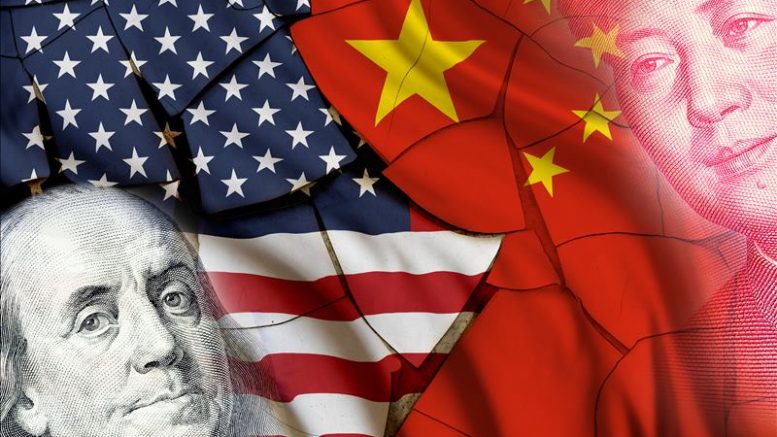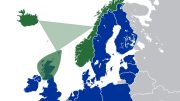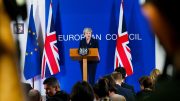Trade deals involve trade-offs and every trade deal the UK strikes will involve some degree of sovereignty shedding, writes Geoff Kitney.
The great phoney war over sovereignty grinds on in its never-ending dishonesty.
It got another burst of celebrity attention a few days ago when the former Prime Minister of Australia and passionate Anglophile, Tony Abbott, implored the British government to simply walk away from the European Union without a deal.
In an article in The Spectator Abbott said that Britons had simply to grasp the chance to again be a great, sovereign nation, free of the shackles of Brussels. Britain’s best future had always been global rather than just within the EU, Abbott argued.
The nub of Abbott’s argument was that, whatever the cost to Britain of leaving the EU, it would be far outweighed by the gains that would come from being able to make its own decisions about who it trades with and on what terms.
A pot of gold awaits a free and sovereign Britain was essentially what Abbott was arguing and he made it clear he was perplexed by the hesitancy of Britain’s leaders.
Putting aside the insouciance of Abbott’s decision – as a former prime minister of a long and deeply trusted ally – to intervene on behalf of the hard-line Brexit opponents of Prime Minister Theresa May, Abbott’s analysis of the case for a no-deal Brexit went even further than some of the wildest claims of his Brexit friends.
Abbott was arguing that the instant restoration of complete sovereignty for Britain the day after Brexit would be so liberating Britain would be set immediately on a path to prosperity.
Whereas, even some of the most hard-line Brexiters concede that the breaking of the shackles that EU membership imposes on Britain’s ability to make sovereign decisions is probably going to take time to be reflected in Britain’s future prosperity, possibly quite a bit of time.
A post-Brexit Britain would have to abide by rules in which it would have a much smaller voice than it had as an EU member state.
The case for Brexit advocated by the most passionate Brexiters is fundamentally about the principle of a sovereign Britain and only incidentally about what the economic effects of this might be. For them, the principle of a sovereign Britain is the only thing that matters.
It’s a very narrow point of view – and one which runs into massive problems when set against the complex reality of a modern world in which the desire for pure sovereignty is simply a fairy tale, impossible to achieve short of putting the British nation on a rocket ship and sending it into its own space somewhere in the netherworld of outer space.
The dream of Brexiters is for Britain to return to its glorious, relatively recent past as the world’s greatest trading nation. They believe emphatically that this can be done, once Britain severs itself from the European single market and the rules that are made in Brussels.
But this ignores the nature of the modern, rules-based global trading system, policed by the World Trade Organization based in Geneva. The WTO is its own bureaucracy which implements a system of rules which are agreed by all its members. A post-Brexit Britain would have to abide by rules in which it would have a much smaller voice than it had as an EU member state.
The WTO has its own judicial system – a bit like the European Court of Justice – which imposes the rules and punishes those who break them.
Outside the EU, every British trade deal that it will have to negotiate to replace EU trade agreements put in place over decades will have to be WTO compliant. Because trade deals involve trade-offs, every trade deal will involve some degree of sovereignty shedding. In fact, to put in place the trade agreements that Britain will need to become “a great trading nation” it will have to go a lot further than this.
No recent free trade deal negotiated anywhere in the world has been achieved without the inclusion of provisions which protect the interests of the trans-national corporations which will conduct the trade in goods and services provided for in the agreement. Those provisions are becoming ever more onerous and demand that the parties to those agreements accept sacrifices to their national sovereignty which go much further than anything demanded by membership of the EU.
These so-called Investor-To-State Dispute Provisions (ISDS) allow companies to sue governments which make sovereign decisions which adversely affect their businesses. Where a complaint is made, the issues are considered in secret by panels of experts who are not accountable to any other authority.
The most aggressive proponent of these provisions is the United States, the trading partner which Brexiters see as the most important candidate for a post-EU free trade agreement.
When President Donald Trump and his supporters speak loftily about how much they are looking forward to doing a FTA with a newly independent Britain, it is an absolutely safe bet that any such deals will be heavily weighted to the corporate interests of US companies.
The U.S. is threatening to block the U.K. from a 46-nation public procurement agreement https://t.co/7eKeLgFzQr via @bpolitics
— Chief-Exec.com (@Chief_Exec_com) 30 October 2018
This would include ISDS rules which would allow them to challenge any law made by a future British government which they could argue adversely affected their businesses.
In the sweeping rhetoric of former foreign secretary Boris Johnson and his backers about the glorious freedom that awaits a “sovereign Britain” the truth of the harsh world of international trade policy and free trade agreements are never mentioned.
But there is also a further emerging reality that should give British decision makers pause for thought about the wisdom or otherwise of a no deal Brexit.
When President Donald Trump and his supporters speak loftily about doing a FTA with a newly independent Britain, it is an absolutely safe bet that any such deals will be heavily weighted to the corporate interests of US companies.
The world economy appears to be at the beginning of a period of uncertainty and risks not seen since the Global Financial Crisis. World trade is declining and protectionism is rising.
Most significantly, the tariff tit-for-tat between the US and China now seems to be morphing into something much more serious. There is growing evidence that the Trump administration is moving to use trade policy as a means of shackling China and undermining its potential to become an economic superpower to challenge US global supremacy.
The US has signalled that it will demand the support of its allies, including by demanding that they do not sign trade agreements with China of which the US does not approve.
For post-Brexit Britain, having the US use a big stick to prevent it from negotiating a major free trade agreement with China would be a massive problem. For Britain to have any chance of maximising the opportunities that it must gain from “reclaiming” its sovereignty, it has to be free to trade on its own terms with both China and the US.
But what the US appears to be signalling is a willingness to use its power to restrict British sovereignty in dealing with China.
Interestingly, in his article urging Britain to walk away from the EU without a deal and to go its own way in the world, Tony Abbott says that Australia’s success as a trading nation in its own right has shown that going it alone works.
Yet experts who are now warning that the emerging tensions between the US and China pose a potentially grave threat to Australia. China is Australia’s major trading partner but the US alliance is Australia’s security guarantee.
If it comes to a point where Australia has to choose between its security and its economic prosperity, it will face a dangerous dilemma.
As a go-it-alone nation, Australia would have only invidious choices to make. It might wish then that it had taken up the idea, occasionally floated over the years, that as a nation of European heritage it should have applied for membership of the European Union.
In fact, to the horror of people like Tony Abbott, that idea might begin to make increasing sense.

Headline image credit: William Potter/Shutterstock.com




